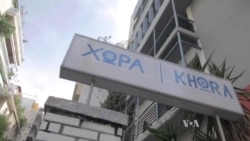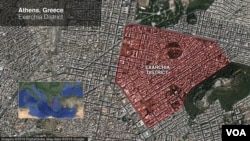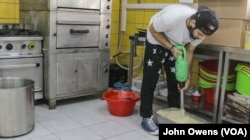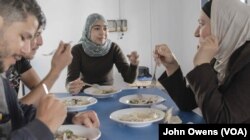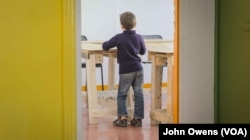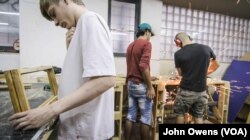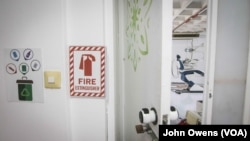It’s noon, and in a kitchen in Athens' Exarchia district, industrial quantities of parsley, tomatoes and lemon are being diced, sliced and squeezed -- preparations for a Syrian meal, and a reminder of home for many of the refugees waiting upstairs.
With the children’s playroom already busy elsewhere in the Khora center, language lessons, soap-making and self-defense classes are planned for later in the day, while work continues to complete the dentist facilities on the fourth floor.
For now, though, at the newly opened space, the focus is on lunch, and giving people wearily accustomed to overcooked pasta and boiled potatoes at the refugee camps something to remember.
“People here have got used to queuing up in distribution lines,” says Hassan Mansour, referring to the meals given out in the many refugee camps that have shot up across Greece in recent months.
“Here we want it to be more like a restaurant, and volunteers like me are more like waiters,” adds Mansour, a Syrian volunteer at the heart of the culinary efforts.
“It’s about making people feel human," he adds.
For those trapped by the politics and closing borders of Europe, the volunteer-run center is not just a much-needed space of support -- it’s a symbol of the changing the nature of refugees’ presence in Greece.
Shifting needs
Khora, a group of volunteers, formed at the start of 2016.
Many of its members spent time working in the Greek islands receiving hundreds of thousands of refugees who took the perilous trip across the Mediterranean from Turkey in response to the perceived absence of NGOs.
However, as press and NGO attention grew on the islands, and as European policy grew increasingly hostile, attention switched to the mainland.
Since Macedonia closed its southern border to Greece this spring, more than 50,000 refugees and migrants seeking legal passage into countries like Germany have become effectively trapped within Greece.
Facing its own deep economic difficulties, the Greek government has struggled to cope with the new population, using both encouragement and coercion to shift people into just 50 camps across the country.
There, many are left in limbo as they wait for requests for asylum or relocation into other European countries.
But with fewer than 6,400 refugees relocated from Greece and Italy out of a total of 160,000 agreed by EU member states in September 2015, the wait is set to be a prolonged one.
It was in this context that the Khora center, which has been funded through grants and donations from small groups and organizations, opened.
“Many [refugees] do not want to stay in Greece, so why build up a sustainable solution in Greece?” asked Liska Bernte, a fellow volunteer with the Khora collective.
“The reality is the border is closed. You can look at the reality all over Europe and you can see this isn’t going to change…people will be stuck here for a really, really long time.”
Wealth of services
Although camps house the majority of refugees in Greece, others are put off by the often remote locations and gravitate toward the cities.
Many head to the district of Exarchia, a politically charged neighborhood in Athens where the left-wing and anarchist community offer solidarity through housing in squats -- when people move into housing without paying for it.
Meanwhile, across Greece, organizations have sought to help fill the gaps in the assistance being provided to refugees, with varying degrees of success.
The Khora center is unusual in its scale.
“This place is amazing, and should be of help to refugees,” says Aaliyah, from Damascus, who is waiting to hear if she has been granted asylum in Greece.
For 10 days she has been attending Greek lessons, which are taught daily in one of two classrooms on the third floor of the center.
“I need to learn this language if I’m going to stay here,” she explains.
More is on the way. A computer room, meeting space for lawyers to advise refugees on their rights and a dentist office are currently also being built.
Between left and right
Not that the Khora center’s arrival has been well-received by everyone.
Iron bars at the windows point to concerns about the occasional presence of far-right groups in the area -- in August, an Exarchia squat named Notara, housing more than 100 refugees, was firebombed, although no one was hurt.
The Khora center also has aroused some hostility from the left.
Although the decision to locate it in Exarchia was based on the high numbers of refugees nearby, some activists in the area are opposed to the presence of the group, which pays for the space rent rather than squats.
But Bernte, who last year finished a masters' degree in development and humanitarian emergencies, explained the choice did not represent a misunderstanding of the area.
It was, she said, a conscious move to offer long-term support for a vulnerable population for whom weeks of waiting already have stretched into months, and may yet stretch into years.
‘Things are very unstable [for refugees],” she said.




